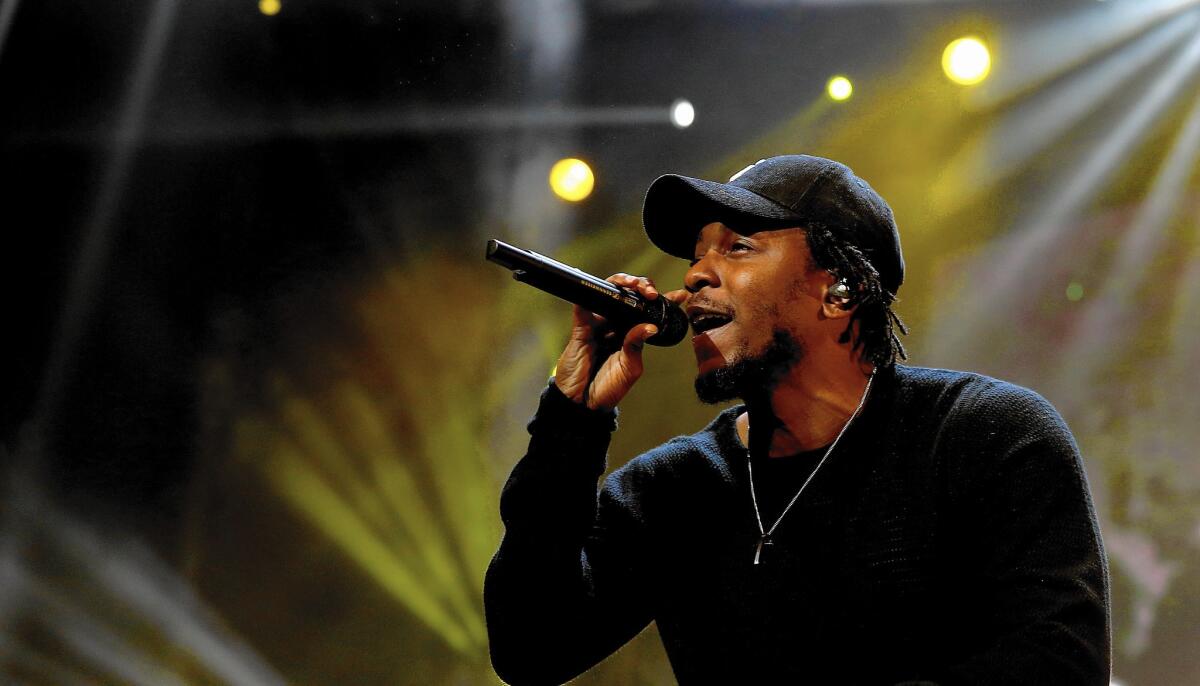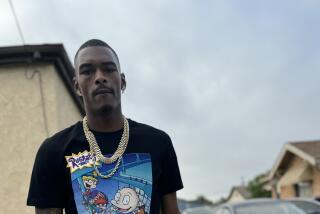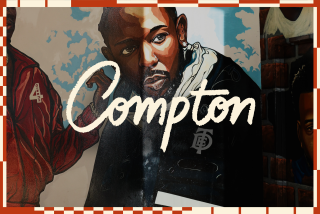The ‘Compton’ moment and how Dr. Dre is asserting the dominance of L.A. hip-hop

“Compton’s” biggest guest star, Kendrick Lamar, is responsible for “To Pimp a Butterfly.”
That Dr. Dre actually released an album on Aug. 7, “Compton: A Soundtrack,” is almost as disorienting as the album being so satisfying and aesthetically of the moment. After working on the near mythical (but real) “Detox” album for more than a decade, Dre finally scrapped it because, in his words, it “wasn’t good.” Dre’s unexpectedly quick reappearance as an album artist with “Compton,” timed to coincide with the release of the “Straight Outta Compton” biopic, is one of a handful of cognitive dissonances running through this moment.
The clearest bit, the trend that Dre has verified, is L.A.’s increasing dominance of hip-hop in 2015. L.A. artists have been trading first place every few months with Drake, who has owned the concert circuit but hasn’t recorded anything as intense as his peers on the West Coast. “Compton’s” biggest guest star, Kendrick Lamar, is responsible for “To Pimp a Butterfly,” a work so stuffed with ambition and musical variety that it can be mildly panic-inducing. Long Beach’s Vince Staples made “Summertime ‘06,” a masterful tweaking of existing elements, an album easy to loop despite being quietly furious. And Staples’ first sponsor, Earl Sweatshirt, released the darkest of horses, “I Don’t Like ... I Don’t Go Outside,” one of the most claustrophobic albums in recent memory. Where trend pieces about leaving L.A. or coming to it are long on rent discussions and short on existential meat, these albums step in. L.A. is way up, and Dre’s “Compton” is the last card in a four-of-a-kind hand.
FULL COVERAGE: ‘Straight Outta Compton’ and N.W.A’s legacy
Which doesn’t mean that Dre uses “Compton” to claim his obvious legacy. The constant witnessing of post-Ferguson, Mo., police brutality, now stretching into its second year, is just another manifestation of the prophecy embodied in N.W.A’s “.... tha Police,” the “Amazing Grace” of resistance against institutional violence. The first time events confirmed N.W.A’s worldview was the L.A. riots of 1992 after the Rodney King verdicts. (A 2008 VH1 documentary about N.W.A, “The World’s Most Dangerous Group,” clearly established how political the act’s stance was and how threatening so many found it.) But on “Compton,” which could easily be 12 variations of “I told you so” while Dre danced on a burning cop car, his foundational role in a pop version of black militancy is reduced to one line about a moment when he ended up “face down on the pavement with the billy clubs” and saying “.... the police” once. This is not a post-Ferguson album.
This is an album curated by an executive at the world’s largest company. What did we expect? Dre’s ascent is not the same as that of ex-punks turned into accountants — look to Circle Jerks and the Jesus Lizard for that pragmatism — or even an airline worker becoming a pop star at age 33. (That was Bill Withers in 1971.) Dre is a gang culture hero-turned-Davos guest. In Ferguson last summer, “.... tha Police” was being played in cars and sung by crowds, but it was a different tune: Boosie’s track of the same name, a song more granular and ruminative than the battle cry of N.W.A’s original, though there’s no doubt about where Boosie got the title. There is also little doubt about what side Dre is on if you pitch the capitalism that cops work to protect against the resistance movement that began before Ferguson, then ballooned after the unpunished shooting of Michael Brown.
Dre’s solo albums have been apolitical affairs for 22 years and running. Dre has talked little about power — other than ways he can obtain more for himself — since “Straight Outta Compton.” When he makes a reference to having “Eminem checks I ain’t opened yet” on “Compton’s” “Talk About It,” it feels more honest than many of his other boasts. Dre’s obsessions have long been the quality of sound and finding new talent. Producer Dem Jointz, born Dwayne Abernathy, already has created one of the beats of the year in “Genocide,” a drunken, sliding beat that deftly recalls Dre’s first song with Snoop Dogg, “Deep Cover,” without reproducing it. The three little-known MCs who carry much of “Compton,” Anderson .Paak, raised in Oxnard, Justus, originally from Dallas, and Raleigh, N.C., native King Mez, all sound like veterans, though they’re not. Dre is good at making people sound more experienced than they are. He coached Eazy-E through every line of “Boyz-n-the-Hood” almost 30 years ago, when Eazy was new to the idea of being an MC at all.
Musically, “Compton” is a translation of “To Pimp a Butterfly’s” freewheeling rummage through genres into a sleek, heat-sealed package. We hear moments of vocal harmony that sound like the Manhattan Transfer, trumpet solos, a variation on trap music’s rapid-fire hi-hats, and a guitar sample from a staple of the record nerd’s library, the self-titled 1976 album by Turkish rock singer Selda. Without Lamar in the picture, it’s unlikely that Dre would have made an album so striated and full of switchbacks.
FULL COVERAGE: ‘Straight Outta Compton’ and N.W.A’s legacy
Also: sound. Listening to “Compton” on headphones recalled the moment in 1993 when I bought a bootleg cassette of “The Chronic” on 7th Avenue. Even with one generation of signal loss, “The Chronic” seemed to be the first rap album mixed like a pop record, playing with the stereo field and reproducing more bass signal than I thought possible. Dre is not listed as the sole producer on a single track on “Compton,” acting more as coach than player here. He still makes sure that an album bearing his name is mixed as if he has access to parts of the audible range that others can’t afford.
The political goofs are minor, but not minor enough. The album opens with a long sample from an undated CBS news report called “Compton Black City.” We hear an announcer using nightly news gravitas lite to intone lines like “with 74% of the population, black power is the fact of life.” The sample isn’t contextualized and ends up being confusing. According to census data, the population of Compton is now 65% Latino and 33% African American. Which era of Compton is Dre trying to talk about, or eulogize, or re-romanticize? It’s entirely unclear. (One may have hoped, in a dystopian time, for a dystopian skit, perhaps a cop pulling over Dre for a broken taillight, recognizing him, apologizing, and professing to be a fan, only to have Dre, well, take over.)
SIGN UP for the free Indie Focus movies newsletter >>
The other misstep comes at the end of “Loose Cannons,” a decent throwaway featuring Xzibit. The end of the song fades into a skit in which an unnamed woman who makes no other appearances on the album is shot and killed by Cold 187um, a rapper who makes no other appearances on the album. The two rappers, and Dre, then plan to bury the woman’s body while reciting lame comic dialogue out of a C-list buddy movie. But these sorts of sketches aren’t just a moral lapse; they’re corny, the new Dad jokes of rap. Nobody’s shocked, but they’re definitely tired. A few days ago, Tyler, the Creator, one of the inheritors of N.W.A’s chaos theory, had to cancel an Australian tour after his variously misogynist lyrics were vigorously protested. This skit is also notable because there’s nothing else remotely like it on “Compton.” If anything reflects Dre hiding in the studio a little too long, it’s the combination of perfect sound and imperfect, slightly dated politics.
In L.A., this quartet is arranged vertically. Lamar is very much part of the city but elevated — think of him standing on a lamp post at the corner of Fig and 11th in the “Alright” video. Staples is walking the streets, slowly, taking notes and talking to himself. Sweatshirt is in the basement, on a sofa, motionless. And way above it all is Dre, in what we know is a private jet. In that imaginary world where politics and art align seamlessly and our favorites magically double as our heroes, Dre would be sweeping the city in a hijacked police helicopter. But Dre did “.... tha Police” once, and that was enough. His heirs heard, and learned.
Twitter: @sfj
MORE:
‘Straight Outta Compton’ film about N.W.A echoes the past and present
N.W.A’s MC Ren hates the official trailer for ‘Straight Outta Compton’
Suge Knight’s arrest foreshadowed in ‘Straight Outta Compton’ scene
FROM THE ARCHIVES: Striking tales of black frustration and pride shake the pop mainstream
More to Read
The biggest entertainment stories
Get our big stories about Hollywood, film, television, music, arts, culture and more right in your inbox as soon as they publish.
You may occasionally receive promotional content from the Los Angeles Times.










